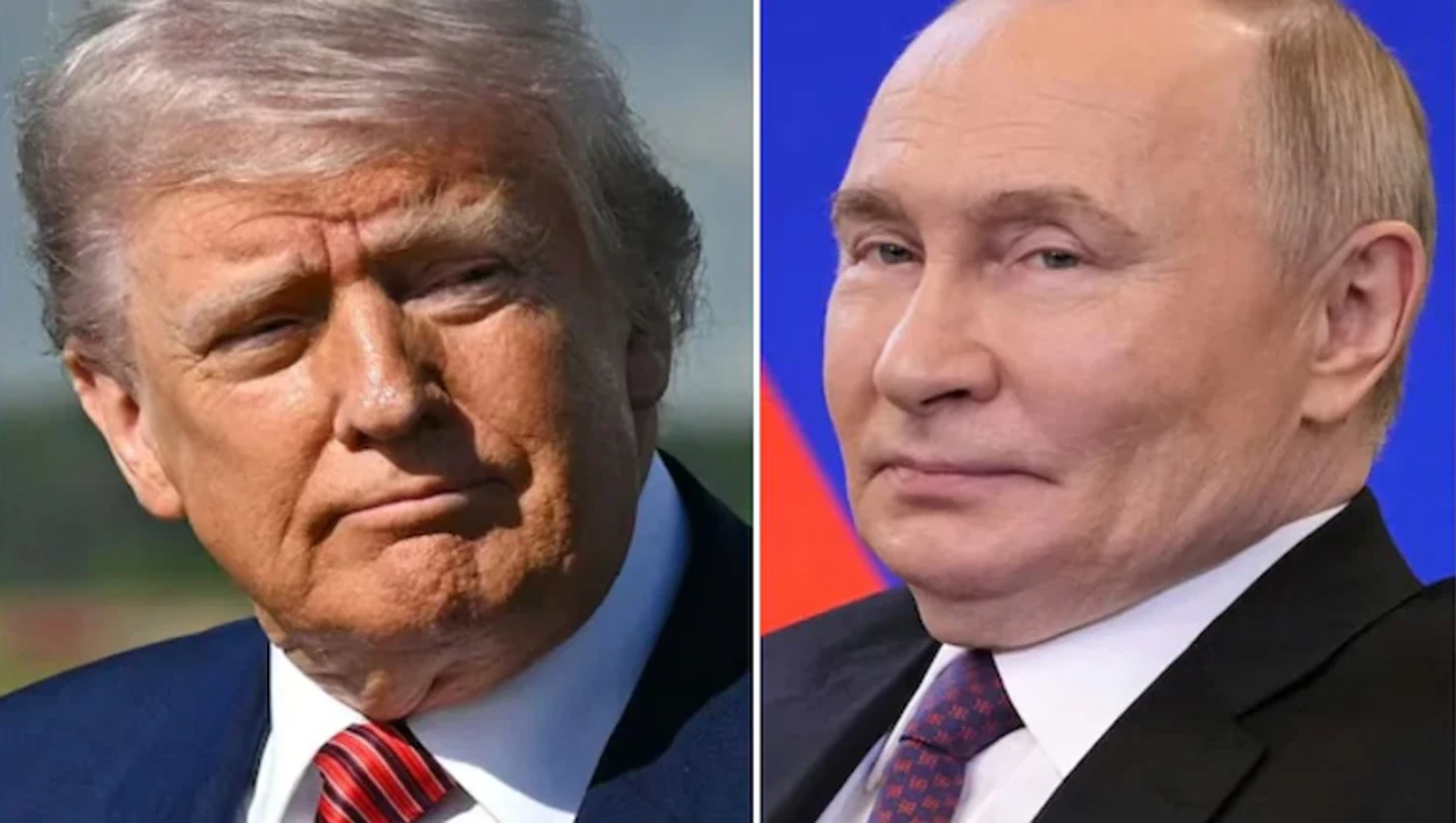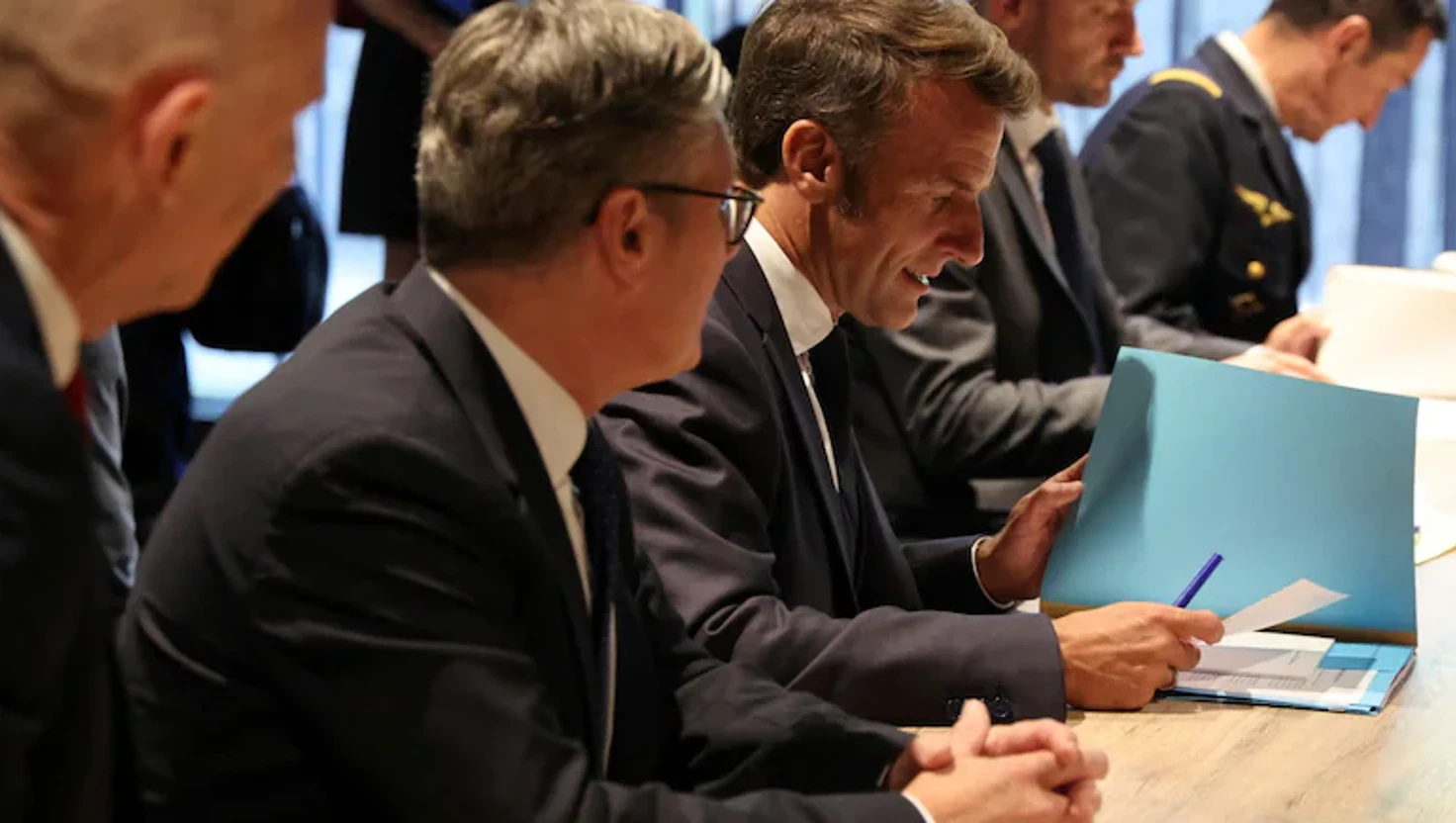Trump warns Russia of 'severe consequences' if Putin does not end Ukraine war

Trump warns Russia of 'severe consequences' if Putin does not end Ukraine war
US President Donald Trump issues stern warning to Russia regarding consequences if President Putin does not agree to ceasefire in Ukraine after summit.
United States President Donald Trump has asserted that there will be "very severe consequences" for Russia if President Vladimir Putin does not agree to halt the ongoing conflict in Ukraine following their upcoming summit in Alaska. Trump made this statement during a virtual meeting with European leaders, where French President Emmanuel Macron reported that the aim of the summit is to broker a ceasefire.
In the same meeting, Ukrainian President Volodymyr Zelensky expressed his view that Putin is attempting to use intimidation tactics ahead of the summit, suggesting that the Russian leader is bluffing about his capabilities. Zelensky remarked that Putin's posturing is meant to convey strength, which he views as an attempt to signify Russia's intention to dominate the entirety of Ukraine.
Zelensky further contended that while Putin claims sanctions do not impact him, they are actually significantly affecting Russia's war economy. "Sanctions are very helpful and are hitting Russia's war economy hard," he stated. Macron confirmed that Trump has been clear about the United States’ position that any territorial discussions concerning Ukraine are to be led exclusively by President Zelensky.
According to Macron, after Trump's meeting with Putin, there is potential for a trilateral discussion involving Trump, Putin, and Zelensky. "We hope that this meeting can take place in Europe, in a neutral location acceptable to all parties," he commented.
German Chancellor Friedrich Merz convened the virtual discussions to ensure European and Ukrainian voices are represented ahead of the summit. After the meetings, he described the dialogue with Trump as "constructive," indicating that significant decisions could emerge in Anchorage, but emphasised that the fundamental security interests of Europe and Ukraine must be safeguarded.
Zelensky underscored the concerns surrounding their exclusion from the summit, pointing out that over 30 conversations with partners have occurred in preparation for the Alaska meeting. However, he remained sceptical about whether Putin would truthfully pursue negotiations to end the war. He communicated this sentiment via his official Telegram channel, stating, "There are currently no signs that the Russians are preparing to end the war," urging Ukraine's allies to intensify their efforts to compel Russia towards peace.
"Pressure must be applied on Russia for an honest peace. We must learn from Ukraine and our partners to prevent deception by Russia," he added. Trump mentioned that he wants to determine whether Putin is genuinely committed to resolving the war, now in its fourth year, characterising the upcoming summit as an opportunity to gauge the Russian leader's intentions.
Concerns have arisen among European allies regarding Trump’s previous comments implying that Ukraine might need to concede some territories controlled by Russia. While he has indicated that territorial negotiations may be necessary, it remains unclear what kind of concessions he expects from Putin. European partners are advocating for Ukraine’s active participation in peace talks, fearing that discussions excluding Kyiv could disproportionately favour Moscow.
Trump has been notably reserved in asserting that he would advocate for Zelensky's inclusion in his discussions with Putin; in fact, he suggested that post-summit discussions could take place among the Russian and Ukrainian leaders, potentially including himself.
The prospects of Putin negotiating a peace deal without the involvement of Ukraine raise alarm bells across Europe, particularly as Putin has orchestrated the largest land conflict in Europe since 1945, leveraging Russia's energy resources to bolster influence over the European Union. Many European nations worry that a successful conclusion for Putin in Ukraine may embolden further aggression towards European countries.
Zelensky disclosed that Putin aims for Ukraine to relinquish control over the remaining 30% of the Donetsk region in any ceasefire scenario, a proposal Zelensky firmly rejected. He reiterated that Ukraine would not concede any territories it governs, labelling such surrender unconstitutional and a potential precursor to future Russian invasions.
Amidst this backdrop, Trump’s administration, just weeks after his return to office, previously removed the possibility of leveraging Ukraine's NATO membership as part of negotiations—a demand from Putin—which has led to renewed discussions about regional security measures between Europe and Ukraine without significant US involvement.
Moreover, analysts monitoring the conflict assert that Ukraine's defence of key areas, such as around Pokrovsk in the eastern Donbas region, is critical. Should Ukraine lose control of Pokrovsk, it would constitute a significant setback ahead of the summit, complicating supply chains and facilitating Russian advances in a region Putin has long sought to control. The situation remains precarious as diplomatic efforts intensify ahead of the crucial meeting between Trump and Putin.
In the same meeting, Ukrainian President Volodymyr Zelensky expressed his view that Putin is attempting to use intimidation tactics ahead of the summit, suggesting that the Russian leader is bluffing about his capabilities. Zelensky remarked that Putin's posturing is meant to convey strength, which he views as an attempt to signify Russia's intention to dominate the entirety of Ukraine.
Zelensky further contended that while Putin claims sanctions do not impact him, they are actually significantly affecting Russia's war economy. "Sanctions are very helpful and are hitting Russia's war economy hard," he stated. Macron confirmed that Trump has been clear about the United States’ position that any territorial discussions concerning Ukraine are to be led exclusively by President Zelensky.
According to Macron, after Trump's meeting with Putin, there is potential for a trilateral discussion involving Trump, Putin, and Zelensky. "We hope that this meeting can take place in Europe, in a neutral location acceptable to all parties," he commented.
German Chancellor Friedrich Merz convened the virtual discussions to ensure European and Ukrainian voices are represented ahead of the summit. After the meetings, he described the dialogue with Trump as "constructive," indicating that significant decisions could emerge in Anchorage, but emphasised that the fundamental security interests of Europe and Ukraine must be safeguarded.
Zelensky underscored the concerns surrounding their exclusion from the summit, pointing out that over 30 conversations with partners have occurred in preparation for the Alaska meeting. However, he remained sceptical about whether Putin would truthfully pursue negotiations to end the war. He communicated this sentiment via his official Telegram channel, stating, "There are currently no signs that the Russians are preparing to end the war," urging Ukraine's allies to intensify their efforts to compel Russia towards peace.
"Pressure must be applied on Russia for an honest peace. We must learn from Ukraine and our partners to prevent deception by Russia," he added. Trump mentioned that he wants to determine whether Putin is genuinely committed to resolving the war, now in its fourth year, characterising the upcoming summit as an opportunity to gauge the Russian leader's intentions.
Concerns have arisen among European allies regarding Trump’s previous comments implying that Ukraine might need to concede some territories controlled by Russia. While he has indicated that territorial negotiations may be necessary, it remains unclear what kind of concessions he expects from Putin. European partners are advocating for Ukraine’s active participation in peace talks, fearing that discussions excluding Kyiv could disproportionately favour Moscow.
Trump has been notably reserved in asserting that he would advocate for Zelensky's inclusion in his discussions with Putin; in fact, he suggested that post-summit discussions could take place among the Russian and Ukrainian leaders, potentially including himself.
The prospects of Putin negotiating a peace deal without the involvement of Ukraine raise alarm bells across Europe, particularly as Putin has orchestrated the largest land conflict in Europe since 1945, leveraging Russia's energy resources to bolster influence over the European Union. Many European nations worry that a successful conclusion for Putin in Ukraine may embolden further aggression towards European countries.
Zelensky disclosed that Putin aims for Ukraine to relinquish control over the remaining 30% of the Donetsk region in any ceasefire scenario, a proposal Zelensky firmly rejected. He reiterated that Ukraine would not concede any territories it governs, labelling such surrender unconstitutional and a potential precursor to future Russian invasions.
Amidst this backdrop, Trump’s administration, just weeks after his return to office, previously removed the possibility of leveraging Ukraine's NATO membership as part of negotiations—a demand from Putin—which has led to renewed discussions about regional security measures between Europe and Ukraine without significant US involvement.
Moreover, analysts monitoring the conflict assert that Ukraine's defence of key areas, such as around Pokrovsk in the eastern Donbas region, is critical. Should Ukraine lose control of Pokrovsk, it would constitute a significant setback ahead of the summit, complicating supply chains and facilitating Russian advances in a region Putin has long sought to control. The situation remains precarious as diplomatic efforts intensify ahead of the crucial meeting between Trump and Putin.

UK, France and Germany Prepared to Re-implement Sanctions on Iran Over Nuclear Actions
The UK, France, and Germany warn of potential sanctions against Iran's nuclear programme if negotiations do not resume by the end of August 2025.
| 2025-08-14

Global Fans and Companies Rally for Release of Rajinikanth's 'Coolie'
Ahead of its release, Rajinikanth's film 'Coolie' prompts holidays, free tickets, and employee outings across India and Singapore.
| 2025-08-14

ICICI Bank Lowers Minimum Balance Requirement After Customer Backlash
ICICI Bank reduces minimum balance for new urban accounts after significant customer feedback, now setting it at ₹15,000.
| 2025-08-14

India Seeks to Host 2030 Commonwealth Games as Bid is Officially Approved
The Indian Olympic Association has sanctioned the bid for the 2030 Commonwealth Games, with Ahmedabad proposed as the host city.
| 2025-08-14

Nagaland Launches Campaign Against High HIV Prevalence Rates
Nagaland begins a two-month awareness initiative to combat the state's second-highest HIV prevalence in India, affecting 1.37% of adults.
| 2025-08-13




